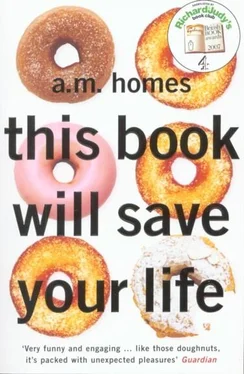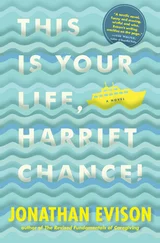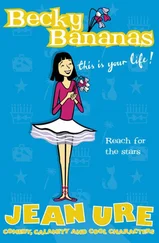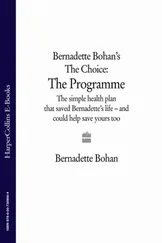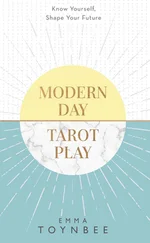He pulls up, uses the snow scraper that's in the car to dust off pretzel crumbs, and goes in. The dog barks at him. "Stop barking," he says, and the dog stops. He goes into the kitchen, gets a glass of water, stands at the sink drinking it, then rinses the glass, dries it, puts it back in the cupboard, goes into the den, and sits. He sits on the edge of the sofa, like it is a waiting room, a way station, as though he has arrived here en route to someplace else. He thinks of leaving. If he gets up and goes, if he doesn't touch anything, no one will know that he was there, that he came and went. If he does it right, he could leave without ever having been noticed. He could put his bag back in the car, the key back under the mat, and check into a hotel, designed for exactly this purpose — dealing with the discomfort of the unfamiliar. The dog jumps onto the sofa, spins a circle, lies down with his head on Richard's thigh, and swallows. Richard sits for a few minutes and then lies down next to the dog, resting his head on the nubbly plaid sofa filled with crumbs, with dog hair, the meaty scent of life. He sleeps.
One of the children comes home. A girl who looks just like her mother, brainy, open-faced. She is a thing about to bloom, not yet self-conscious, not yet self-editing.
"What's wrong with you?" she asks.
"What do you mean?"
"They said if you were coming here something was wrong — otherwise why would you come. Are you dying? Broke? Are you going through that thing?"
"What thing?"
"Men-o-pause?"
"Men don't go through menopause."
"Then why is it called menopause ?"
"I don't know."
"So why are you here?"
"I don't know, I felt like I needed to come, like I needed to see everyone. Do you ever feel like you need to see someone, just to make sure they still exist?"
"Are you having a nervous breakdown? That's what people talk about when they're having a nervous breakdown. Does having the nervous breakdown makes you wonder about that, or does wondering about it give you the nervous breakdown?"
"That's always the question. How old are you?"
"Almost twelve."
IT IS Thursday night; Meredith's mother is there, the two girls, and a six-year-old boy Richard didn't know existed. Dinner is a well-orchestrated production, out of the fridge, into the oven, and onto the table; everyone helps.
After dinner they pile into the family car, a beige minivan; he's in the second row, in a thick captain's seat that reminds him of the one time he went deep-sea fishing.
"All aboard?" his brother asks.
The mother-in-law is having an opening at a local coffee shop, paintings she's done since her stroke. After a lifetime of doing everything with her right hand, she is now reliant on the left, dragging the right side of her body around like a deflated Siamese twin.
Friends of the family come to the Bean N' Brew. They take the mother-in-law's paintings seriously. They ask questions: How long have you been painting? Do you paint every day? Have you ever tried gouache? Everyone is proud. No one mentions that the paintings look like paint-by-number. They give compliments: I love your use of color, your brush strokes are so lush.
"I have always had a passion for color," the mother-in-law says, her speech slurred. "Anyone can paint," she tells him, "even you."
Equally enthusiastically, they introduce Richard to their friends.
"My brother," his brother says, slapping him on the back.
"I always thought you were an only child."
"Older or younger?"
By virtue of getting a Ph.D., marrying first, and having a baby first, his brother and Richard long ago traded places: Richard went from being the older to the younger, losing whatever early advantage he might have had.
"Older," Ted says, handing the title back.
"SO — WHAT brings you to Boston — business?" the brother asks, when they are back at the house.
Silence. He forgot to make up a story.
"Everything all right?" the brother asks.
"I think so," Richard says. "And you?"
"Good. Everything is good. At least I think it's good; I've had a lot on my mind."
His brother, Ted, is a physicist, an inventor, a visionary who is not stopped by anything. When Richard was younger, people used to ask, "What did your brother invent?" and Richard would say, "The world."
"Let's get you set for the night," the brother says, leading Richard upstairs to Barth's room.
"I have no memory of being a child," Richard says looking around the room, which is stuffed with the memorabilia of a boy's life.
"You were serious."
"And what were you — not serious?"
"I was a builder, always making things with balsa wood."
"That's what I remember — the smell of airplane glue. Did we have toys?"
"I think you had a cash register… a red Tom Thumb."
His brother goes to the linen closet for sheets, towels, and a pillow. There's something about his brother carrying the bedding that is so sweet, domesticated, not what you'd expect the great inventor to be doing.
"That's funny. I think I remember carrying around a red metal cash box like it was my friend, but I'm never sure if what I'm remembering was real," Richard says.
"You loved money; nothing made you feel better than to have money in your pocket."
"I have no memory of that," Richard says.
"You were a very good salesman. You went up and down the street, door to door, selling seeds you ordered from the back of a comic book. You even managed to sell seeds to people who didn't have gardens; that impressed everyone."
"They must have felt sorry for me."
"You made Dad take you to the bank to open your own account. And you used the points you got from selling seeds to get 'prizes,' and then you sold the prizes — don't you remember you got me my microscope?"
"Vaguely. Did the microscope work?"
"It worked great. We stabbed our fingers to get blood and we made slides…"
"It's all a little blurry."
"You were man about town until someone with no teeth asked, 'Do you sharpen knives?' and you got scared and quit. That, and Dad hated you going door to door."
"He thought I was begging."
"He called you a peddler. And then we had a newspaper route and we were jealous of the guy who had the New York Times route and got to go around collecting money and giving people little yellow receipts. We rolled our papers with advertisements, tied them with a rubber band, and then went building to building and left them on everyone's door."
"Why do I not remember this?"
Ted shrugs. "You were always forgetful; it was like you could only hold so much information and then you'd short-circuit."
"And Dad — what was he like?"
"He wasn't like much — tried not to stand out, that was his goal, to not be noticed. He used to tell us that, whatever we did, we should be careful not to attract attention."
"Now that you're telling me, it sounds sort of familiar. What else did we do?"
"We sat outside, watching people. I made things. You counted your money."
"What do you mean?"
"Literally, if you had a pile of pennies, you counted them, put them in order, and wrote down how much."
"How old was I?"
"Maybe nine? That was your idea of fun. Other kids played with marbles or soldiers, and you played with loose change, arranging your pennies, nickels, and dimes into brigades, and moving them across the Oriental rug as part of some kind of war game where quarters could take over, some sort of strategy for winning all the money. I never really understood the rules."
"And what did you do?"
"Marbles. I liked playing on that rug also. It used to drive Mom crazy, the two of us in the living room. She used to make you wash your coins with soap and water because she didn't want you to get her carpet dirty."
Читать дальше
